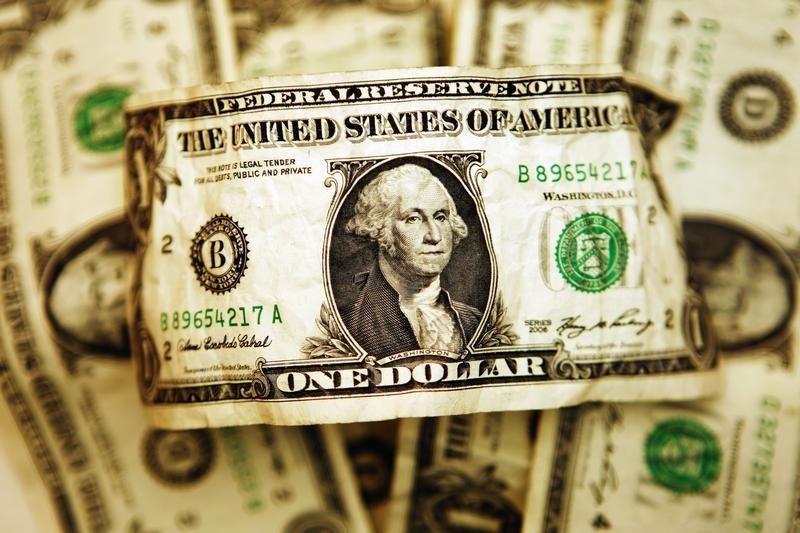Investing.com - The move by U.S. authorities to confiscate Russian assets could add to recent efforts to diversify from the dollar, but the greenback is still likely to remain the global reserve currency for the foreseeable future, according to Wells Fargo.
Is the dollar’s role as reserve currency in question?
The United States and its allies prohibited transactions with Russia's central bank and finance ministry and blocked about $300 billion of sovereign Russian assets in the West, following Russia’s invasion of Ukraine.
Ramping up the potential punishment, the U.S. House of Representatives passed a bill late last month allowing the Biden administration to confiscate these Russian assets held in American banks and transfer them to Ukraine.
Such an action would likely result in retaliation, with Dmitry Medvedev, a close ally of President Vladimir Putin and the deputy chairman of Russia's Security Council, stating that Russia may respond to any U.S. confiscation of its currency reserves by seizing the assets, including property and cash, of U.S. citizens.
That would have a very limited impact on the dollar in its role as a reverse currency, but would likely attract the attention of China given the Asian giant’s material exposure to the U.S. dollar.
Concerns about the U.S. fiscal outlook and the persistent use of economic sanctions by Washington have already brought the dollar’s role as a global reserve currency into question in some capital cities. Adding in the risk of having assets confiscated could reinforce the thinking.
“U.S.-China geopolitical tensions, theoretically, should prompt China to make a concerted effort to move away from dollar and other advanced economy assets,” analysts at Wells Fargo said, in a note dated May 3.
Moves to limit dollar’s importance
There have already been some moves over the years to try and downplay the dollar’s significance.
These included developments such as Brazil and China announcing clearing arrangements in each other's currencies, energy exporting Middle East nations willing to accept renminbi as payment, as well as a possible BRICS nation common currency.
However, Wells Fargo has downplayed the significance of these moves.
The China-Brazil trade relationship is worth only around 0.40% of total global trade, the U.S. bank noted, far from material enough to result in noticeable de-dollarization.
“We also had doubts that Middle East energy exporters, most of whom operate under a fixed exchange rate regime to the U.S. dollar, would be willing to potentially put currency pegs at risk by generating less dollar revenues,” analysts at Wells Fargo said, “and a BRICS common currency, in our view, is unlikely to gather momentum.”
Dollar reserve currency status to endure
To be considered a “reserve currency,” certain characteristics must be demonstrated, Wells Fargo said, including being freely convertible, widely accepted and used in trade and global transactions, backed by large and liquid debt markets easily accessible to foreign investors and not subject to political influence,i.e. associated with an independent central bank.
The U.S. dollar checks all of these boxes, and while other currencies are also associated with these characteristics, Wells Fargo thinks issues exist that will prevent the dollar from losing its status.
The euro and British pound are freely convertible, not pegged, nor subject to capital controls, but the government debt markets are not as deep as the U.S. and the risks of fragmentation in the eurozone could provide FX reserve managers with pause for thought.
The Japanese government bond market has been, and continues to be, significantly distorted by the Bank of Japan, and Chinese government bonds, capital controls and convertibility concerns as well as the managed exchange rate regime of the renminbi should provide disincentive for reserve managers to allocate currency holdings toward Chinese assets.
“Taking these factors into account, we see limited alternatives for FX reserve managers to U.S. government bonds and, accordingly, view the U.S. dollar's status as the global reserve currency as secure for the foreseeable future,” Wells Fargo added.
Morgan Stanley agreed, saying dollar influence in the global economy across a range of economic and financial metrics remains strong and thus seeking a replacement is a difficult task.
"The most discussed competitor is China, and we do expect a modestly more global role for CNY,” analysts at Morgan Stanley said, in a note last month.
"But we think that China’s ‘3D challenge’ of debt, deflation and demographics will limit CNY's international appeal," MS added, estimating that currency reserves in yuan should rise to only 5% in 2030 from 2.3% now.
"We expect only a moderate and gradual decline in USD’s international use, given the rise in multipolarity and continued low diversification costs for reserve managers."
